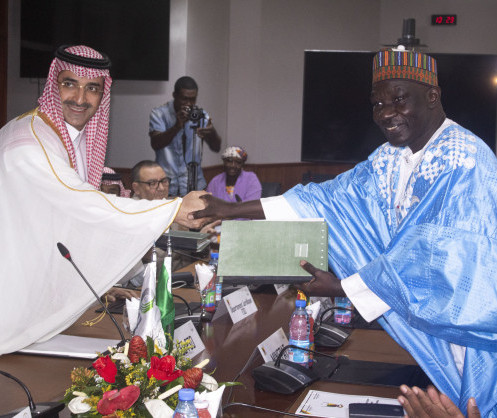The financing agreement will help to build and equip the hospital with a capacity of 200 medical beds and develop specialized medical departments, centers, and buildings spanning a total area of 14,000 m2
Today, the Saudi Fund for Development (SFD) (www.SFD.gov.sa) signed an agreement with the Cameroonian Government to finance the construction of the Mbalmayo Regional Hospital Project, with the provision of a soft development loan amounting to USD 12 million. The agreement was signed by SFD CEO, Mr. Sultan bin Abdulrahman Al-Marshad, and the Cameroonian Minister of Economy, Planning, and Regional Development, Alamine Ousmane Mey.
The financing agreement will help to build and equip the hospital with a capacity of 200 medical beds and develop specialized medical departments, centers, and buildings spanning a total area of 14,000 m2. The project will also include an area for operational services covering up to 8,500 m2. The hospital will be fully furnished and equipped with electricity, water, and sewage facilities. The development plan also comprises the rehabilitation of the road that connects the hospital to the national road to ensure easy access to the hospital. The project will also include a helicopter landing pad for medical emergencies.
The project is expected to serve thousands of people from the Cameroonian capital as well as neighboring cities and villages, providing access to quality healthcare services. It will help tackle chronic disease and reduce mortality rates. The hospital will also alleviate overcrowding in Yaoundé and Douala hospitals.
Since 1977, SFD has provided — in addition to this agreement — development loans to finance nine (9) projects in Cameroon
The signing ceremony was attended by Mr. Abdulrahman Alzaben, Chargé d’Affaires at the Embassy of the Kingdom of Saudi Arabia to the Republic of Cameroon, and several officials from both nations.
In his speech, SFD’s CEO Al Marshad affirmed that the project will be co-financed by SFD, the Kuwait Fund for Arab Economic Development, and the Arab Bank for Economic Development in Africa (BADEA), with a total value of USD 38.8 million. Mr. Al Marshad reiterated that the project is a vital undertaking that will positively contribute to the social development of the Cameroonian people. The project will provide the necessary support for basic infrastructure services, enabling society members to access all their daily needs to improve their social and economic living conditions.
Al Marshad expressed his appreciation for the efforts exerted by both nations for more than 40 years to achieve the UN’s Sustainable Development Goals (SDGs). The project, he emphasized, is of great importance to safeguarding Cameroon’s future and ensuring the development of its burgeoning and thriving sectors.
Minister Mey praised the important role played by the Government of the Kingdom of Saudi Arabia, through SFD, in supporting development projects and improving the health sector in Cameroon. He emphasized the importance of the developmental relationship with the Fund over the past decades. The Minister further underlined that the Mbalmayo Regional Hospital project will be essential to people and communities across Cameroon, offering greater access to quality care and modern, specialized medical centers.
The Government of the Kingdom of Saudi Arabia realizes the importance of supporting the development sectors in Cameroon through SFD-funded development projects and programs.
Since 1977, SFD has provided — in addition to this agreement — development loans to finance nine (9) projects in Cameroon amounting to USD 109 million to enhance the growth and prosperity of the infrastructure, water, transportation, education, and health sector to help achieve the UN’s Sustainable Development Goals (SDGs).







OTHER ARTICLES
Editorial — Prevent, inform, and act for women’s health in Africa
Kenya : Government Prioritises Maternal Health and Strengthens Support for Community Health Promoters
Strengthening pandemic prevention, preparedness, and response capacities in Senegal using the “One Health” approach